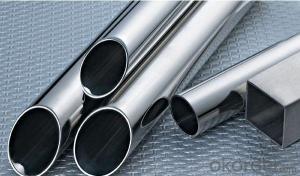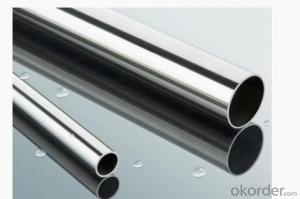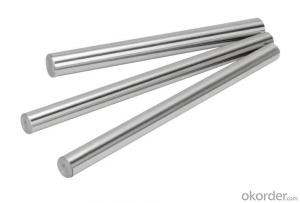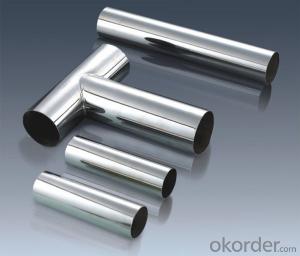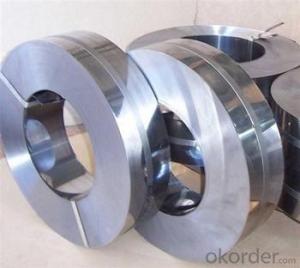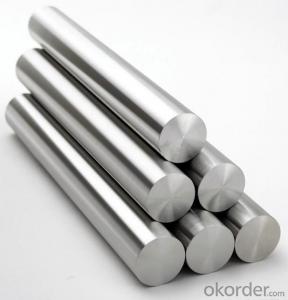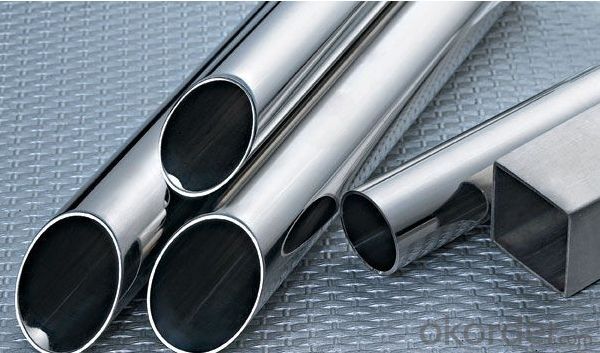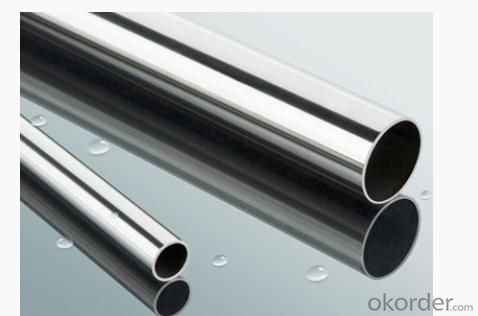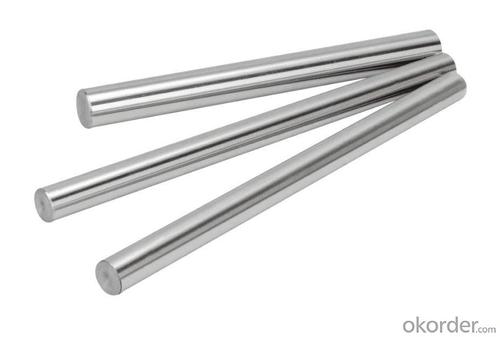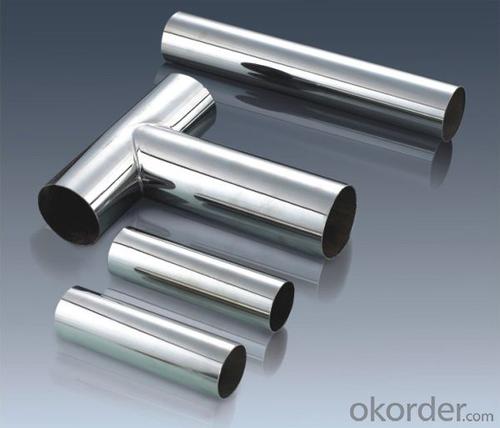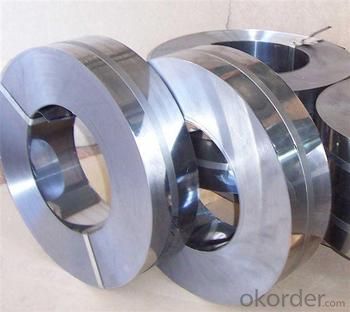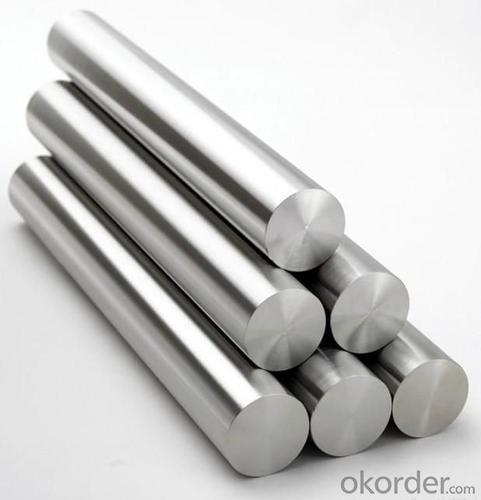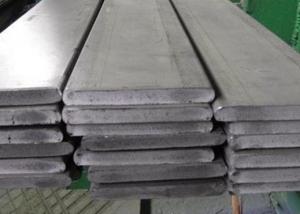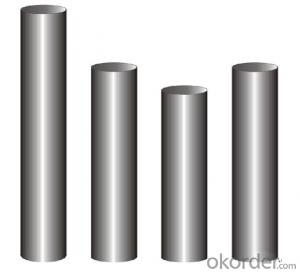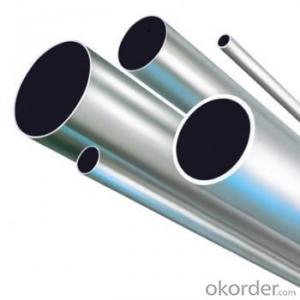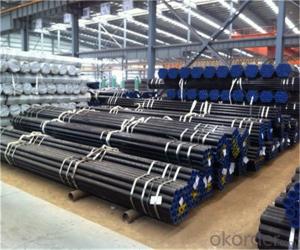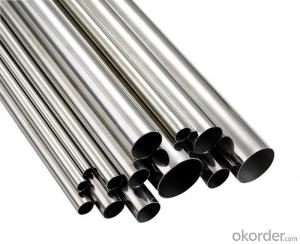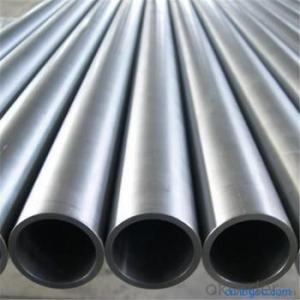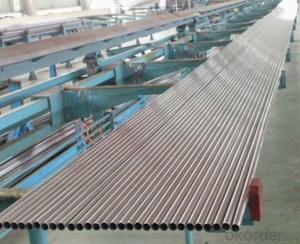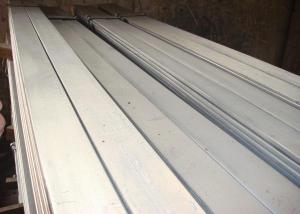Stainless Steel tube 304 with excellent quality
- Loading Port:
- Shanghai
- Payment Terms:
- TT OR LC
- Min Order Qty:
- 1000 m.t
- Supply Capability:
- 1000000 m.t/month
OKorder Service Pledge
OKorder Financial Service
You Might Also Like
Stainless steel 304
Product Information of stainless steel:
- Width: customized
- Surface: 2B/BA/6K/8K/NO.4/HL.
- Thickness: 0.3mm - 3.0mm.
- Delivery time: 15-25 days.
- Length : As customer's requirement.
- Package: With export standard packing or customize packing.
- Payment Terms: T/T (30% deposit pay in advance and the balance before shipment) , irrevocable L/C.
Company advantage:
-Top Equipments, Leading In The Industry.
- Professional Team, Leading Innovation.
- Huge Supply Capacity Advantage, Timely and Effective Delivery.
- Modern Logistic, Fact and Convenient.
- Precise Manufacturing, Exquisite Products.
- Serve People, Create Value.
- Dimensional Network, Powerful Expansion.

- Q: Can stainless steel pipes be used for sewage systems?
- Yes, stainless steel pipes can be used for sewage systems. Stainless steel is a highly durable and corrosion-resistant material, making it suitable for various applications, including sewage systems. Stainless steel pipes are capable of withstanding the harsh elements found in sewage, such as corrosive chemicals, high temperatures, and abrasive solids. Additionally, stainless steel pipes have a smooth surface, which minimizes the risk of clogs and blockages in the sewage system. This makes stainless steel pipes a reliable and long-lasting choice for sewage systems, ensuring efficient and effective waste disposal.
- Q: How do you prevent backflow in stainless steel pipes?
- To prevent backflow in stainless steel pipes, there are a few key measures that can be taken. 1. Install a backflow preventer: This is a mechanical device that is installed in the pipe system to ensure that water flows in one direction and prevents any backflow. There are different types of backflow preventers available, such as check valves, double check valves, and reduced pressure zone devices. The selection of the appropriate backflow preventer depends on the specific requirements of the system and local codes and regulations. 2. Regular maintenance and inspection: It is important to regularly inspect the backflow preventer and ensure it is functioning properly. Any signs of wear or damage should be addressed immediately to prevent potential backflow issues. Regular maintenance can also include cleaning and replacing any worn-out parts to ensure optimal performance. 3. Pressure regulation: Maintaining proper pressure in the stainless steel pipes can also help prevent backflow. High pressure can cause water to flow in the opposite direction, leading to backflow. By installing pressure regulators or pressure-reducing valves, the water pressure can be controlled and maintained within the recommended range. 4. Air gaps: Incorporating air gaps in the system can provide an additional layer of protection against backflow. An air gap is a physical separation between the water source and the point of use, ensuring that there is no direct connection that could allow backflow to occur. 5. Adequate system design: Proper system design is crucial in preventing backflow. By ensuring that the stainless steel pipes have the correct sizing, appropriate slope, and proper connections, the risk of backflow can be minimized. Additionally, locating the backflow preventer in an easily accessible area can facilitate regular maintenance and inspection. By implementing these preventive measures, the risk of backflow in stainless steel pipes can be significantly reduced, promoting the safe and efficient flow of water in the system.
- Q: Are stainless steel pipes suitable for fire protection systems?
- Indeed, fire protection systems find stainless steel pipes to be a suitable option. The reason lies in the fact that stainless steel possesses remarkable resistance against corrosion, a trait of utmost importance for fire protection systems, which frequently encounter water or other corrosive substances. The ability of stainless steel pipes to endure high temperatures while preserving their structural integrity enhances their dependability for the transportation of water or other fire suppressants. Furthermore, the durability and extended lifespan of stainless steel pipes contribute to a decrease in the necessity for frequent replacements or repairs. All in all, stainless steel pipes are widely favored in fire protection systems due to their reliability, resistance to corrosion, and durability.
- Q: What is the difference between Type 409 and Type 410 stainless steel pipes?
- Type 409 stainless steel pipes are commonly used in automotive exhaust systems due to their excellent resistance to high temperatures and corrosion. On the other hand, Type 410 stainless steel pipes are known for their higher strength and hardness, making them suitable for applications that require increased durability and resistance to wear and abrasion.
- Q: What is the maximum temperature that stainless steel pipes can withstand?
- The grade of stainless steel used determines the maximum temperature that stainless steel pipes can tolerate. Typically, stainless steel pipes have the capability to withstand elevated temperatures between 1200 and 1600 degrees Fahrenheit (650 to 870 degrees Celsius). Nevertheless, it is crucial to acknowledge that extended exposure to these extreme temperatures can weaken the stainless steel, potentially leading to deformation or failure. To determine the maximum temperature limits for a specific grade of stainless steel pipe in a particular application, it is always advisable to refer to the manufacturer's guidelines or consult with a materials engineer.
- Q: What is the impact strength of stainless steel pipes?
- Stainless steel pipes possess a generally high impact strength, rendering them resistant to cracking or breaking when subjected to applied force or impact. The exceptional toughness of stainless steel, characterized by its capacity to absorb energy and deform without fracturing, is widely acknowledged. This characteristic is attributable to the microstructure of stainless steel, which comprises a combination of austenite and ferrite phases. The presence of these phases grants stainless steel pipes superior impact resistance in comparison to other materials. The impact strength of stainless steel pipes varies depending on the specific grade or alloy employed. For example, austenitic stainless steels, such as grades 304 and 316, are renowned for their remarkable impact strength. Due to their ability to endure impact loads without failure, these grades are extensively utilized in various industries, including construction, oil and gas, and chemical processing. Moreover, the impact strength of stainless steel pipes can be further bolstered through different heat treatment procedures, such as tempering or quenching. These processes alter the microstructure of the steel, resulting in improved mechanical properties, including enhanced toughness and impact resistance. In conclusion, stainless steel pipes possess robust impact strength, making them highly suitable for applications that necessitate resistance to impact or shock loading. The ability of these pipes to withstand substantial forces without fracturing or breaking guarantees their longevity and dependability across diverse industries.
- Q: Can stainless steel pipes be pickled and passivated?
- Yes, stainless steel pipes can be pickled and passivated. Pickling is a process that removes impurities and scale from the surface of stainless steel, while passivation is a treatment that forms a protective oxide layer on the surface to enhance corrosion resistance. This process is commonly used in industries such as oil and gas, chemical, and food processing to ensure the cleanliness and longevity of stainless steel pipes. Pickling and passivation can be done using a variety of acidic solutions and techniques, depending on the specific requirements of the pipes and the desired outcome.
- Q: Can stainless steel pipes be used for architectural applications?
- Stainless steel pipes are applicable for architectural purposes, offering a multitude of advantages. With its durability and versatility, stainless steel proves to be a reliable material. Its corrosion resistance makes it ideal for outdoor use, even in harsh weather conditions. Moreover, stainless steel pipes contribute to the aesthetic appeal of architectural designs, providing a modern and sleek look. They can be utilized for various architectural elements, including handrails, balustrades, structural supports, and decorative features. Additionally, their strength and reliability make them suitable for load-bearing applications, ensuring the safety and stability of architectural structures. Overall, stainless steel pipes are a popular choice for architectural applications due to their functionality, durability, and aesthetic appeal.
- Q: Are stainless steel pipes suitable for oil refinery applications?
- Stainless steel pipes are indeed suitable for oil refinery applications as they possess outstanding resistance to corrosion. This exceptional property renders them an excellent choice for the transportation and processing of oil and various petroleum products. The corrosion-resistant nature of stainless steel prevents any deterioration of the pipes resulting from exposure to the corrosive substances and chemicals commonly encountered in oil refineries. Moreover, these pipes can withstand high temperatures and pressure, which ensures the safety and efficiency of oil refinery operations. In addition to these advantages, stainless steel is renowned for its durability and longevity, thereby minimizing the need for frequent maintenance and replacement. In conclusion, the utilization of stainless steel pipes in oil refinery applications provides a dependable and cost-effective solution.
- Q: Are stainless steel pipes suitable for food processing applications?
- Yes, stainless steel pipes are highly suitable for food processing applications. This is because stainless steel is resistant to corrosion, easy to clean and sanitize, and does not react with food or alter its taste. Additionally, stainless steel pipes comply with hygiene and safety standards, making them ideal for the food industry.
Send your message to us
Stainless Steel tube 304 with excellent quality
- Loading Port:
- Shanghai
- Payment Terms:
- TT OR LC
- Min Order Qty:
- 1000 m.t
- Supply Capability:
- 1000000 m.t/month
OKorder Service Pledge
OKorder Financial Service
Similar products
Hot products
Hot Searches
Related keywords
